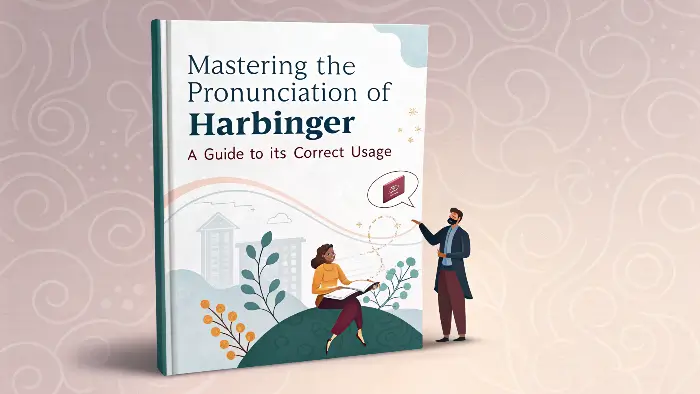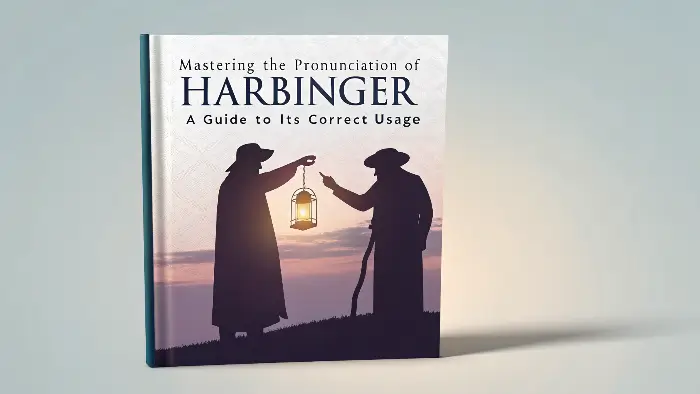Mastering the Pronunciation of ‘Harbinger’: A Guide to Its Correct Usage

Mastering the Pronunciation of ‘Harbinger’: A Guide to Its Correct Usage
The word “harbinger” may sound mysterious to some, but its meaning is both rich and significant. Whether you’re a native English speaker or learning the language, understanding the correct pronunciation and usage of “harbinger” can elevate your vocabulary and help you communicate more effectively. In this article, we’ll explore how to pronounce “harbinger,” its definition, and how to use it in sentences with examples.
What Does ‘Harbinger’ Mean?
The term “harbinger” refers to something that signals or foreshadows a future event or situation. It is often used to describe someone or something that brings a sign of what is to come, typically something significant or transformative. In a more literal sense, “harbinger” can be used to describe a person or thing that precedes and indicates the arrival of another.
For example:
- “The first robin of spring is often seen as a harbinger of warmer weather.”
- “The economic downturn was a harbinger of the challenges that lay ahead.”
In these examples, the harbinger is an indicator or a precursor to something greater or more important that will follow.
Pronouncing ‘Harbinger’ Correctly

The pronunciation of “harbinger” is often a source of confusion, but once you know the correct sounds, it’s easy to say. The word is typically pronounced as:
- /ˈhɑːrbɪndʒər/ (HAR-bin-jer)
Let’s break it down:
- HAR – The first syllable rhymes with “car” and is stressed.
- bin – This syllable is short, similar to “bin” or “pin,” and is not stressed.
- jer – The final syllable sounds like “jer” and is unstressed, like the “ger” in “manager.”
So, the correct pronunciation is HAR-bin-jer, with emphasis on the first syllable.
It’s important to avoid mispronouncing it as “har-binger” (with a soft “g” sound) or “har-bing-er” (where the “g” is pronounced more sharply). The proper pronunciation has a soft “j” sound at the end.
How to Use ‘Harbinger’ in Context
Now that you’re familiar with how to pronounce “harbinger,” let’s look at how to use it in different contexts. As mentioned earlier, “harbinger” is often used to indicate something that signals or foreshadows something that is coming.
Here are a few examples of how you might incorporate “harbinger” into your writing or conversation:
1. In Weather and Nature Contexts
- “The early blooming of flowers is a harbinger of spring, signaling warmer days ahead.”
This example shows “harbinger” used to describe how a natural phenomenon (the blooming of flowers) is a sign of the upcoming season (spring).
2. In Political or Economic Discussions
- “The sudden spike in unemployment rates could be a harbinger of a recession.”
In this case, “harbinger” is used to describe an economic trend that might indicate a future downturn.
3. In Literature or Film
- “The dark clouds in the sky served as a harbinger of the tragic events that were about to unfold.”
This usage gives “harbinger” a more dramatic tone, indicating a future event that could be ominous or significant.
4. In Personal or Emotional Contexts
- “His sudden change in behavior was a harbinger of the personal struggles he was about to face.”
Here, “harbinger” foreshadows something that will happen in a person’s life, indicating a transition or shift.
Common Mistakes to Avoid
While “harbinger” is relatively straightforward once you know the proper pronunciation, there are a few common mistakes to be aware of:
- Mispronunciation: As mentioned, it’s easy to mistakenly pronounce the word as “har-binger” instead of “har-bin-jer.” Make sure to emphasize the first syllable and use the soft “j” sound at the end.
- Using It Incorrectly: Some people may use “harbinger” in situations where a simple “sign” or “indicator” would be more appropriate. “Harbinger” generally refers to something with a more significant or ominous implication, so be mindful of the context in which you use it.
- Confusing ‘Harbinger’ with ‘Forerunner’: While “harbinger” and “forerunner” are similar in meaning, a “forerunner” typically refers to a person or thing that comes before and prepares the way for another, while a “harbinger” tends to carry a stronger suggestion of something ominous or important to come. For example:
- “The early elections were a forerunner to political change.”
- “The earthquake was a harbinger of the devastation that followed.”
Tips for Mastering ‘Harbinger’ in Conversation
If you want to confidently incorporate “harbinger” into your everyday speech or writing, here are a few tips:
- Listen to Native Speakers: One of the best ways to master the pronunciation of a word like “harbinger” is to listen to native speakers. Pay attention to how they emphasize syllables and pronounce the “j” sound in the final syllable.
- Practice with Context: Try using “harbinger” in different contexts to get a feel for its meaning and nuances. Practice saying it in a sentence, focusing on the proper stress and pronunciation.
- Start with Simple Sentences: Begin by using “harbinger” in simple, everyday scenarios. For example:
- “The black cat is often seen as a harbinger of bad luck.”
- “The new moon was a harbinger of new beginnings.”
- Explore Its Etymology: The word “harbinger” comes from Middle English “herbenger,” meaning a person who goes ahead of others to prepare a place. Understanding its history can help reinforce the correct usage and pronunciation.
Conclusion
Mastering the pronunciation and correct usage of “harbinger” can significantly enhance your vocabulary and communication skills. Whether you’re describing a change in the seasons, foreshadowing a major event, or analyzing a piece of literature, using “harbinger” effectively will help you express yourself with clarity and confidence. Just remember to pronounce it “HAR-bin-jer” with the emphasis on the first syllable, and use it in contexts that involve a significant signal of what’s to come.
By incorporating “harbinger” into your daily vocabulary, you’ll not only enrich your language but also impress others with your ability to use a sophisticated and meaningful word with ease.







